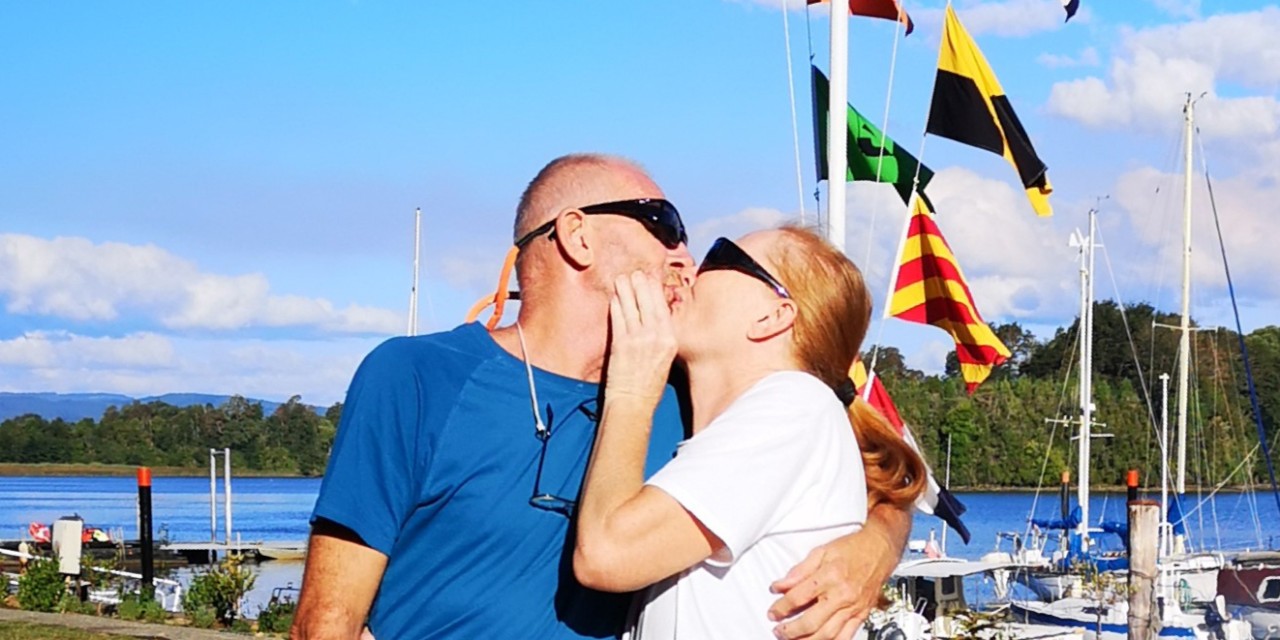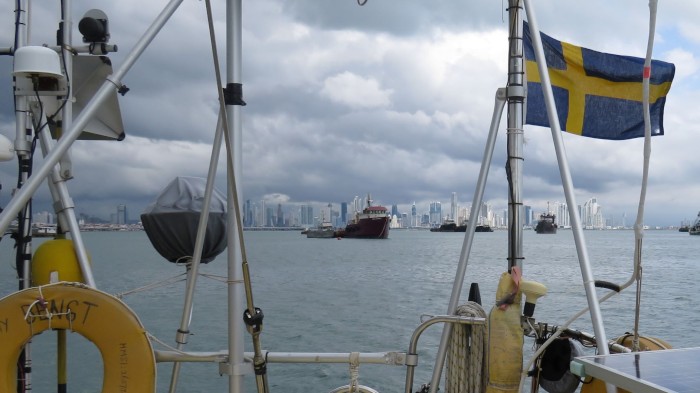Bild: Panama-City from the anchorage
Monday morning was not the quiet moment before the transit that we had hoped for. The blackwater-pump hung itself, so we had to disassemble it and clean the entire pump because it had some ‘toilet stuff’ stuck between the valves. Because the fault was on the pressure side, we had a lot of disgusting toilet-stuff running in the bilges. Yuck! It was me who had to unscrew everything, and I had to be very careful because my wound on the left underarm was not healed yet.
There were some other things that needed to be fixed, payment of the marina among others. The greywater tank had constipation and had to be opened with the result that the dishwater sprayed out of the hose and onto the floor and in the bilges.
We were just finished with cleaning-up when our line-handlers, Paul, Marion and Katharina showed up. Last we saw Paul and Marion was on Lanzarote more than a year ago, so it was good to see them again. After lunch it started raining. The Canal transit contains a lot of waiting so after we had left the marina we just let Bengt drift around on the Flats. We were going through the Canal with a German boat, 'Antje', which had already anchored there. Since the bottom consists of soft mud we did not anchor to prevent getting a lot of mud on and in the boat. After an hour of drifting in the rain, our Advisor came with the pilot boat and we started our transit. The advisor was a nice and charming man who loved Elisabeth's banana cake. We continued towards the first locks 'Gatun locks' where we had to wait a while again. The rain was pouring down. We passed under the newly opened bridge over the canal, complete with lights in the Panama flag’s colors. Impressive!
Then we had to hurry.
We went alongside 'Antje' and moored to each other, ‘nesting’. Then it went slowly into the lock. Since Bengt was the largest boat, we had to do most of the maneuvering into the lock. You have to try to hold the boats in the middle of the lock chamber. The advisor was very good and had full control. The throwing lines with their monkey-fists came flying over the boats (we had covered some of the solar panels just in case) and the long lines were attached to them. Then the casting guys went with us into the lock where there was already a ship ' Georgia M’ moored. It stopped raining. The doors were closed and now there was no return to the Atlantic for Bengt.
There is some turbulence when the water is released so the Line-handlers had to work hard to keep the lines tight and the boats in the middle of the chamber. Our Advisor constantly told them which ropes would be tightened or which would not. It is the advisor on the boat in the middle (e.g. ours) that has control. After that the ship was pulled by the locomotives to the next chamber, we were able to move forward, but only after the lines were taken back to the boat. The casting lines remained attached to the boat and the men on land had to go with them up the steep lock wall. We had to keep 'walking-speed'. In the second chamber the same procedure.
The last chamber is the most difficult because the turbulence is greatest here (fresh meets saltwater) and the ship starts using its propeller to get out of the chamber. Just then one of Antjes ropes snapped off in the middle and we started being tossed around in the turbulence. The advisor called the lockmaster and the propeller stopped. Antjes crew got a spare line ashore and then we could proceed.
After half an hour of motoring across Lake Gatun, past the new locks and eating dinner on the way, we moored for the night to a large buoy. The advisor was picked up and we prepared for the night. This was the first time we had so many people sleeping on Bengt so this needed some organizing. Paul and Marion borrowed our bed in the back, Katharina slept in the doghouse and Elisabeth and I took the sofa in the saloon. The night was hot with many mosquitos, but everybody was in a good mood in the morning although maybe not so alert.
Coffee and breakfast helped and at 07.15 a.m. we were ready for the advisor.
We had gotten 07:15 as time the advisor would come aboard the night before but he didn’t show up until 08:15. As before we proceeded immediately towards the canal. Now we had long stretches of straight motoring. The sun came out and it was hot outside. The crew went inside, some slept, and some read. Outside the advisor and I. He was a nice guy but young and not to talkative. We had lunch, coffee and looked for crocodiles. The canal is steep to, so you come close to the shores. Some showers past but otherwise we had nice weather. Paul steered awhile so I could stretch my legs and go to the toilet.
Finally, we past under both bridges connecting North and South America and stopped to wait for our turn to lock down. According to the advisor we had been to slow and missed our ‘schedule’. We had been motoring at more than 5,5 knots (the speed given by us to the Ad-measurer) but speed over ground had been less since we had the current against us. We also had to wait several times for an hour or so to let ships with dangerous goods pass us in a wide section of the canal. After waiting for ‘our’ ship, ‘Ocean Mercury’, we nested with Antje and went slowly in the chamber. Locking down yachts are in front of the ship, so we went in first. Here you have to be careful to have all lines, especially the back-lines, tied and tight before the ship enters the chamber since it creates a large current. The advisor was very specific about this. After passing the first chamber it started raining. The thunderstorm was right over us. Visibility zero. The last lock ‘Mira flora’ has a visitor’s center where lots of people were standing on the balconies watching the ships go in and out of the locks. Now it poured down, but we could see the Pacific Ocean ahead of us, an unforgettable moment despite the rain. This was the second time that I sailed into the Pacific via the Panama Canal (the first time was 34 years ago). Locking down is easier than locking up, no turbulence, so all went well.
Once out of the locks we untied from 'Antje' and proceeded to the Balboa Yacht Club were the advisor was picked up and Stanley came and collected his lines and fenders. We recommend him, wonderful man. After another hour of motoring in total darkness we anchored in Las Brisas in front of Panama City.
Daniel, Katharina’s husband, came to pick up our line-handlers but first we had a toast, with bubbly, to the Pacific. We slept while Bengt was safely anchored in a new ocean.
Wednesday afternoon Paul and Marion came by and picked up Elisabeth to go to town. My arm was troubling me so I stayed on Bengt. To get into town from Las Brisas you take the bus. The problem is that the driver does not handle cash of any kind so you need a bus card which you charge with a few dollars. This card can only be purchased from a machine in the bus station at Albrook. This machine is only in Spanish so you need someone to help you. Paul and Marion had done this before so they took Elisabeth with them (bus ride is 25 cents) so she could get the card (2 dollars). Another complication is that the dinghy dock dries at low water so you can’t tie up or leave for about one hour before and after high water.
Thursday was cleaning day. The deck and cockpit had become very dirty during the transit so they were scrubbed clean in the rain. We also dried out towels, cushions, pillows, sheets, etc. when the sun was out and cleaned up the whole boat inside. In the evening we were invited for a sundowner on ‘Nana’.
Friday gave us a huge thunderstorm passing straight over us. We could see the lightning striking down in the city. After it cleared up we took the dinghy ashore and had a walk around the three islands, Isla Naos/Culebra, Isla Perico and Isla Flamenco which are connected to each other by ‘The Causeway’. There are some shops, mainly small chandleries and restaurants, and two marinas who are so expensive that nobody want to tie up there. Even a buoy at Balboa Yacht Club is ridiculously expensive at 100 dollars for the first night.
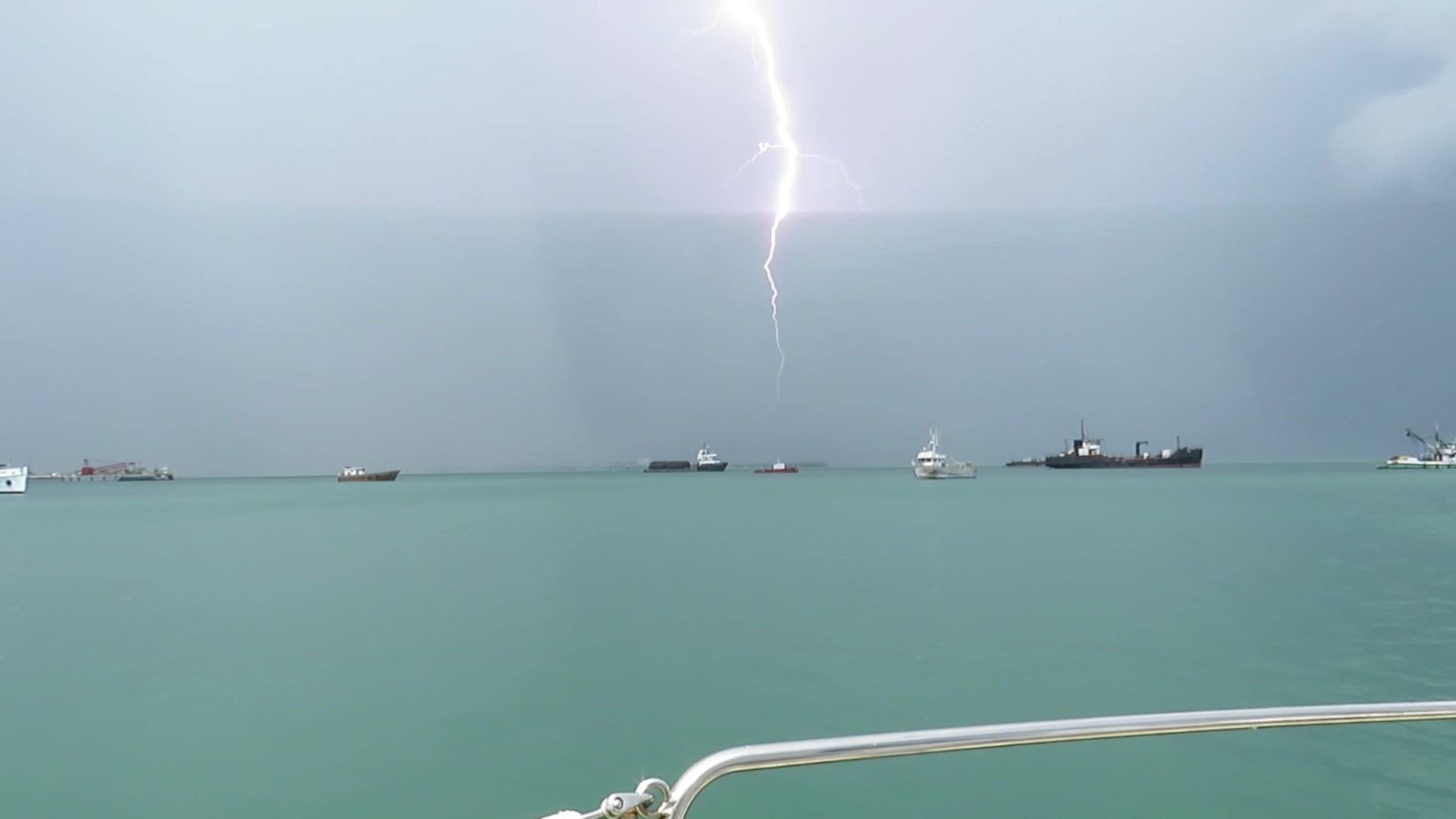 Lots af lighting every day.
Lots af lighting every day.
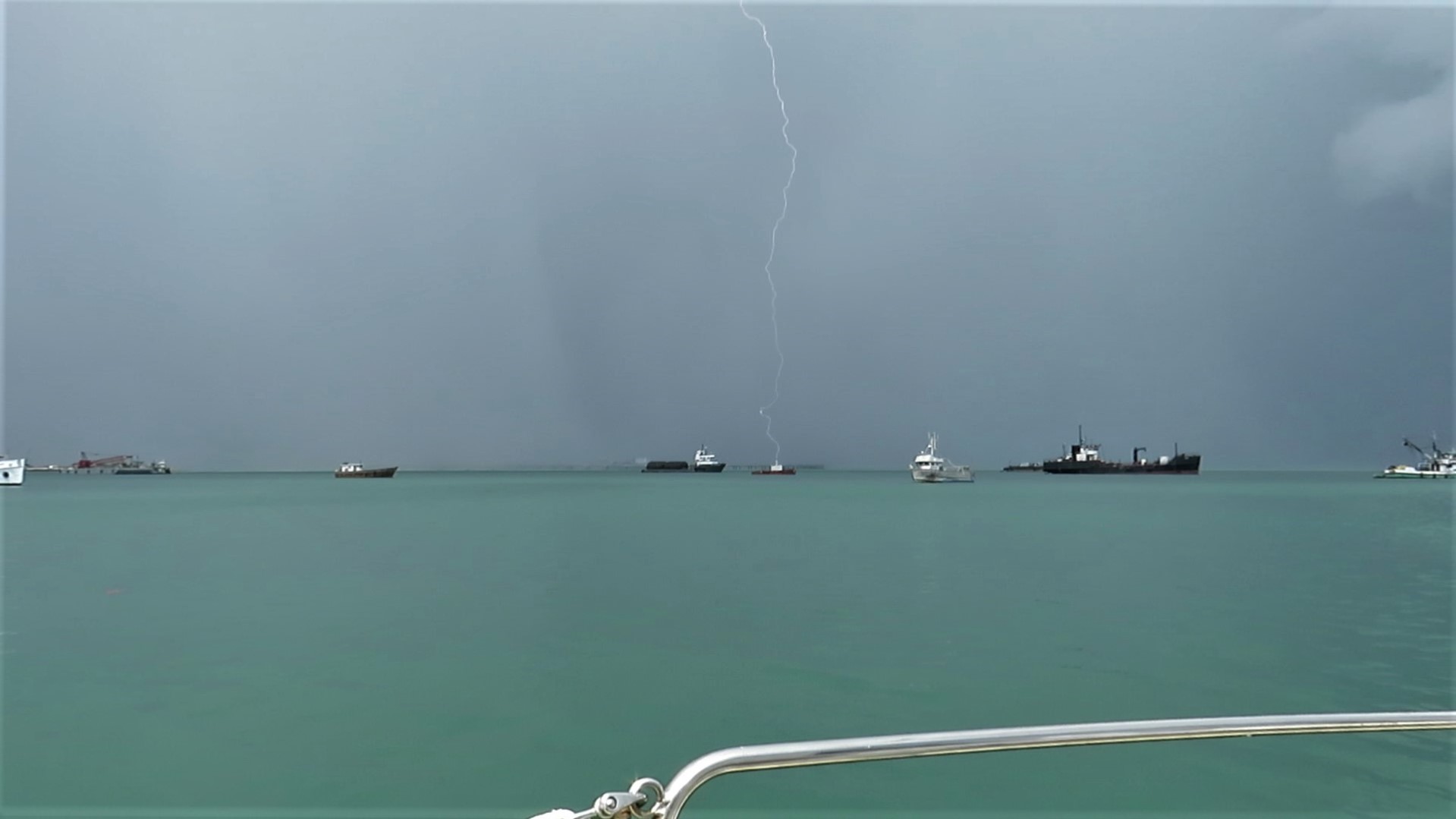
Saturday we took the bus to Albrook Mall, a huge shopping centre next to the bus and metro station Albrook. Although most shops sell clothes, shoes and mobile phone stuff we did find a huge supermarket ‘Super 99’ and a good hardware store ‘Do it’ where they sell watermaker filters and other goodies a sailor might need. We even found a fog-horn on air which we promptly put in our basket. Even if we had transited the canal and nobody had asked for it we bought it anyway. You never know what the authorities in Chile or Argentina are up to. To get to the mall you have to pass the bus station and the metro station. It being Saturday there were lots and lots of people around going to the mall, to the busses and to the metro. The noise was appalling and combined with the ever present loud music you soon longed for a quit anchorage with only the water clucking on the hull. Even so in all the shops we visited we only med kind and helpful people even if their English was worse than our Spanish. In the hardware store the manager even looked things up on internet since we could not make it clear to him what we were looking for. The supermarket was total chaos with Christmas food and decorations lying on tables were you normally drive your shopping trolley. But here too all were nice and friendly and helped when we stood sort of lost in the vegetable department.
Since we took the bus early in the morning, before low water at noon, we had some hours to kill before we could use the dinghy again so we walked around the mall and had lunch. The bus back got stuck in the Saturday traffic-jam and progress was very slow. We didn’t mind that since the rain poured down from the skies. So much that the streets had more than 10 cm of water in them. When the bus moved a few meters and drove through the water the children behind us screamed with exitment. Water came through the doors onto the floor but this seemed to be normal. Nobody took notice apart from us tourists. On the way to Isla Perico (the name of the bus stop) you pass a lot of rather pompous government buildings decorated with flags and other things in the colours of the Panamanian flag (red, white and dark blue). Some buildings have their lawns covered with small flags. The country has had some serious corruption problems and financial scandals. As in most countries in the Americas (Canada exclusive) most wealth is concentrated with a few very rich people. When this becomes too obvious, like now in Chile, Ecuador and Bolivia people start protesting. The ruling classes react, as always, with violence. We have been having some discussions about sailing to Chile or not because of the violence the police and army have been using against the unarmed and mainly peaceful protesters. A while it was like back in the days of Pinochet, people ‘disappeared’ or ‘committed suicide’ in prison so we decided not to sail there but to Canada instead but it seems to have calmed down so we stick to the original plan. But this can, off course, change.
Here in Panama one feels that this with flag waving is a means to keep the people quiet and happy. A case of ‘Panem et circensus’, maintain the Status Quo and keep the power where it is.
We got off the bus and waited at the bus stop until it stopped raining before we went to bail out the dinghy so we could take us back to Bengt. November is the worst rain month according to all people we talked to. It seems to fit.
Sunday was cleaning day again. We had caught a lot of water in our water-catcher so we scrubbed the cockpit again, cleaned inside, hoovered and did the laundry. I wrote this blog both in Swedish and in English. Since we mainly seem to socialise with German sailors we should write this blog in German as well.
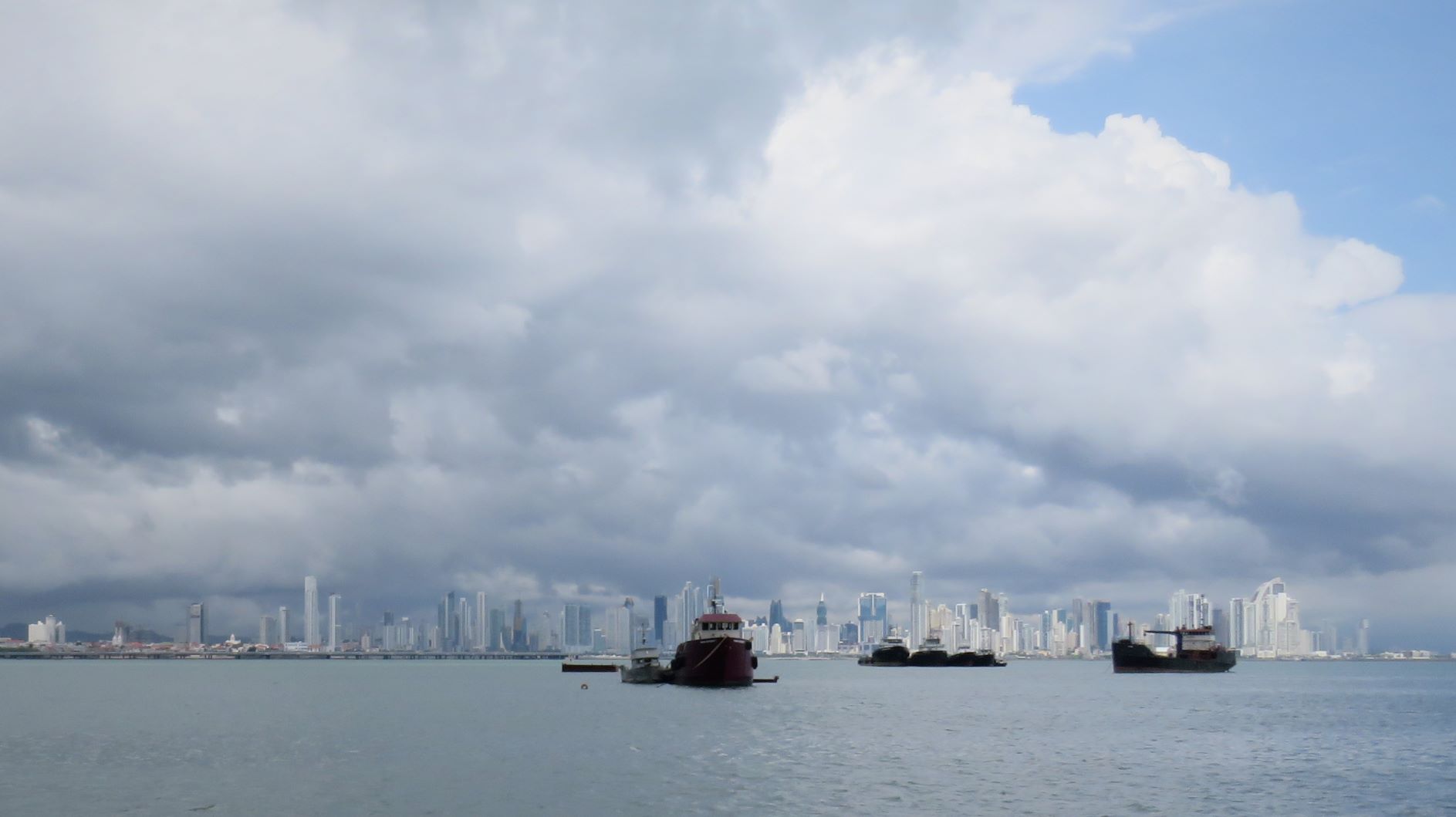
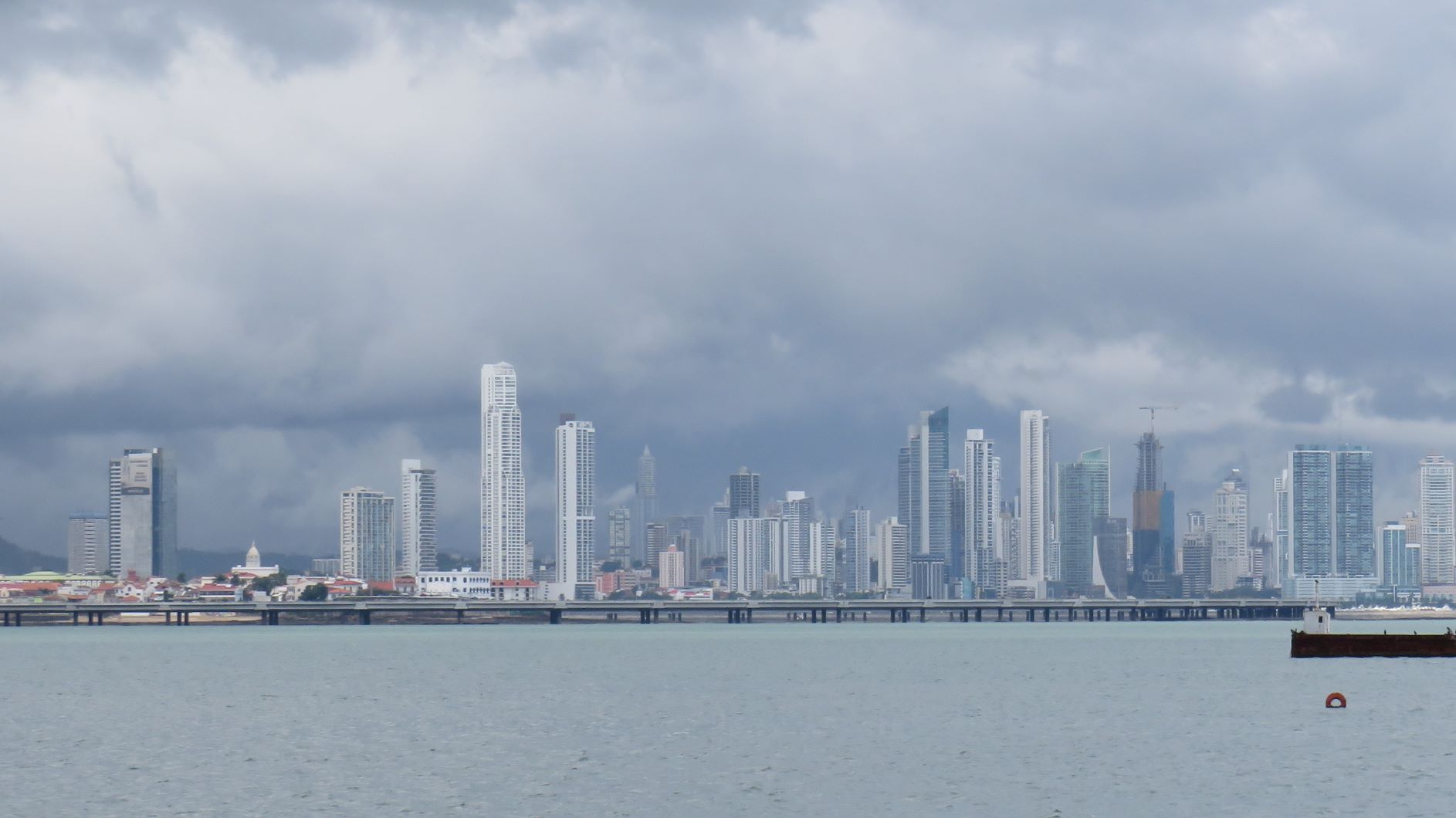
Next week we will travel back to Colon by buss to help our friends from ‘Artemis’ with their canal transit. After that we will clear out, sail to Las Perlas a few days and wait for a decent wind to start our voyage to Rapa Nui (Easter Island).
Until next week!
